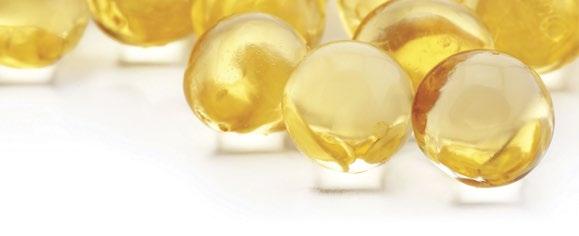
6 minute read
Omega3 Prime™
Premium fish oil concentrate for heart, brain and joint support
Omega-3 fatty acids EPA and DHA are among the most important brain and heart health nutrients. When we’re young, omega-3s help brain development;1 in later years they protect against cognitive decline;2 and throughout our lives they optimize brain cells for healthy function.3-5 In addition, according to the American Heart Association and the National Institutes of Health (NIH), omega-3s may help support healthy blood pressure and reduce the risk of heart problems.6, 7 Several studies also demonstrate the anti-inflammatory properties of omega-3 fatty acids. Research suggests that omega-3s may help relieve joint discomfort and reduce symptoms associated with inflammation.8 The problem? Most of us don’t get enough EPA or DHA.9
Omega3 Prime contains premium golden fish oil concentrate that is carefully formulated to be:
Potent: 1,000 mg serving is concentrated in omega-3s: 670 mg EPA and 125 mg DHA
Convenient: Just two small, easy-to-swallow soft gels make omega-3s a breeze to take Pleasant: Natural lemon-flavored soft gels—no fishy odor or aftertaste Sustainable: Ingredients sourced from Friend of the Sea suppliers – dedicated to conserve marine habitats and resources
Quality, every step of the way:
• Highly refined and pharmaceutically distilled to provide the most pure form of omega-3s • High quality control standards that help ensure potency, limit fish oil oxidation, neutralizing fishy odor and aftertaste
GREAT
for the HEART!
THIS PRODUCT IS ALSO GREAT FOR:

CARDIOVASCULAR SYSTEM SUPPORT
HEALTHY INFLAMMATION SUPPORT
Omega3 Prime™
#31320 $29.99 Receive 120 VitaPoints!
Suggested use: Adults, as a dietary supplement take two (2) soft gels daily.
Omega3 Prime™
Quantity: 60 soft gels Serving size: 2 soft gels Amount per serving: Omega-3 Fish Oil 1,000 mg, EPA (Eicosapentaenoic Acid) 670 mg, DHA (Docosahexaenoic Acid) 125 mg, Omega-3 Other 205 mg. Other Ingredients: Gelatin, glycerin, purified water, and lemon oil.
References:
1 Helland IB. Pediatrics. 2003 Jan;111(1):e39-e44. 2 Yurko-Mauro K. Curr Alzheimer Res. 2010 May;7(3):190-6. 3 Kotani S, et al. Neurosci Res. 2006; 56:159–64. 4 Cole GM. J Nutr. 2010, Apr;140(4):869-74. 5 Meyer BJ. Lipids. 2013 Sep;48(9):863-8. 6 https://www.heart.org/HEARTORG/Encyclopedia/Heart-and-Stroke-Encyclopedia_
UCM_445084_ContentIndex.jsp?title=omega%203%20fatty%20acids 7 https://ods.od.nih.gov/factsheets/Omega3FattyAcids-HealthProfessional/#h7 8 https://lpi.oregonstate.edu/mic/other-nutrients/essential-fatty-acids 9 Kris-Etherton, et al. Amer Journ Clin Nutr, Vol. 71, No. 1, 179S-188S.
YOUR NEEDS Love. K2 COMPLETELove.
If you’ve ever suffered from cardiovascular disease or heard your heart isn’t in good shape from the doctor, you’re not alone. According to the Centers for Disease Control and Prevention (CDC) about one in five heart attacks are silent, meaning the person wasn’t aware they had one and about 647,000 Americans die from heart disease each year. Our hearts are essentially the center of our life-force and learning we may not have been taking care of our hearts like we should can be a harder pill to swallow than any medication or supplement. While damage may have been done early on, unbeknownst to our younger selves, further damage to the heart and cardiovascular disease in general may be prevented if a healthy lifestyle is followed. This includes daily exercise, not smoking, maintaining a healthy weight and eating a nutritious diet with hearthealthy ingredients. One such nutrient found to benefit the heart is vitamin K, namely Vitamin K1 and K2 which occurs in the human diet. Vitamin K2 is hard to find in the Western diet, which is why we’ve made it easy with our new supplement, K2 Complete (see page 8) containing three forms of Vitamin K: Vitamin K2 as menaquinone-4 (MK-4) and menaquinone-7 (MK-7) and Vitamin K1 as phytonadione.
What Do the Studies Say?
Vitamin K deficiency can lead to calcification (mineral deposits) of vessel walls that has been associated with a higher risk of cardiovascular events. Consuming enough Vitamin K2 may lower the risk of vascular damage.1 Vitamin K2 is often missing in the Western diet as it is usually found in fermented foods and is not usually included in junk foods commonly found in an American diet.1,2 Vitamin K1 can be found in plant-based foods such as kale, spinach and broccoli. Vitamin K2 has different forms of menaquinones (MK), and K2 Complete contains both MK-4 and MK-7 to ensure you get the adequate amount. One study found that in a normal Western diet, MK-4 was the only vitamin K2 form detectable and MK-7 was often below the limit of detection due to very low concentrations and3 was detectable after MK-7 supplementation.4

Nobody has ever measured, not even poets, how much the heart can hold.”
-Zelda Fitzgerald
Moving on From Heart Ache
There is probably no other organ or body part that is mentioned more in literature, television, plays or movies than the heart. From “follow your heart” to “a broken heart,” the heart is responsible for numerous sayings and is at the center of many great literary work’s love stories. But the heart also does so much more. We all experience an ache in our heart at one point or another, and the ache or tightness in the chest we feel after feeling sad or stressed is a physical reaction to emotional stress. Emotional pain has been found to trigger the same brain regions as physical pain, which may explain the body’s physical reactions to emotions.5 Outside of our emotions, the heart is responsible for pumping blood throughout the body to the organs. You can feel your heart beat fast after exercise, whether that’s from chasing after your kids, grandkids or attending a workout class. The heart is working to pump more oxygen to your working muscles. With all the responsibilities on the heart’s plate, it’s no wonder that cardiovascular disease is a leading cause of death for both men and women in the United States, per the CDC.
Listen To the Heart Research
While it’s imperative to listen to what your doctor has to say, making sure your heart has the right nutrients can help give it the extra TLC it needs. Vitamin K2, specifically MK-7, has been widely researched for heart-healthy benefits.6-8
Research Has Shown:
• If at least 32 mcg of Vitamin K2 is present in the diet, then the risks for blood-vessel calcification and heart problems are significantly lowered.6 • High-intake of Vitamin K2 was associated with protection against cardiovascular events.7 • Long-term use of MK-7 supplements (found in Vitamin
K2) improved arterial stiffness, which is related to hypertension and high blood pressure, in healthy postmenopausal women.8 Being aware of how to take care of the heart can help it perform its functions so you can keep living an active life. If you have heart concerns, consult with your doctor and consider our K2 Complete supplement so you don’t fall victim to heart disease.

References
1. Maresz K. Proper Calcium Use: Vitamin K2 as a Promoter of Bone and Cardiovascular Health. Integr Med (Encinitas). 2015;14(1):34-39. 2. McFarlin BK, Henning AL, Venable AS. Oral Consumption of Vitamin K2 for 8 Weeks Associated With Increased Maximal Cardiac Output During Exercise. Altern
Ther Health Med. 2017;23(4):26-32. 3. Riphagen IJ, van der Molen JC, van Faassen M, Navis G, de Borst MH, Muskiet FA, et al. Measurement of plasma vitamin K1 (phylloquinone) and K2 (menaquinones-4 and -7) using HPLC-tandem mass spectrometry. Clin Chem Lab Med. 2016;54(7):1201–1210. doi: 10.1515/cclm-2015-0864. 4. van Ballegooijen AJ, Beulens JW. The Role of Vitamin K Status in Cardiovascular Health: Evidence from Observational and Clinical Studies. Curr Nutr Rep. 2017;6(3):197-205. doi:10.1007/s13668-017-0208-8 5. Kross, E., et al. “Social Rejection Shares Somatosensory Representations with Physical Pain.” Proceedings of the National Academy of Sciences, vol. 108, no. 15, 2011, pp. 6270–6275., doi:10.1073/pnas.1102693108. 6. Geleijnse JM, Vermeer C, Grobbee DE, et al. Dietary intake of menaquinone is associated with a reduced risk of coronary heart disease: the Rotterdam Study.
J Nutr. 2004;134(11):3100–3105. 7. Gast GC, de Roos NM, Sluijs I, et al. A high menaquinone intake reduces the incidence of coronary heart disease. Nutr Metab Cardiovasc Dis. 2009;19(7):504–510. 8. Knapen MH, Braam LA, Drummen NE, Bekers O, Hoeks AP, Vermeer C. Menaquinone-7 supplementation improves arterial stiffness in healthy postmenopausal women. A double-blind randomised clinical trial. Thromb Haemost. 2015;113(5):1135-1144. doi:10.1160/TH14-08-0675










